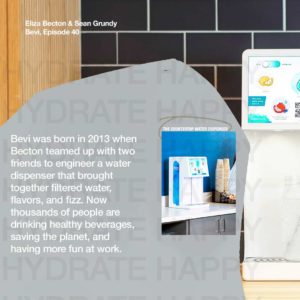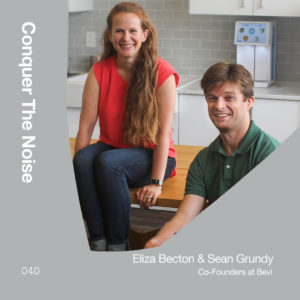Podcast
Eliza Becton and Sean Grundy Created Bevi To Change The Behavior Around Bottled Water
Jonathan speaks with Eliza Becton and Sean Grundy, co-founders of Bevi. The beverage industry is one of the least sustainable industries with about ½ of the top 10 plastic polluters worldwide. They saw an opportunity to change the industry from the inside out by creating a sustainable beverage company using smart beverage dispensers in corporate offices. Their machines purify water at the point of use and then mix in a variety of other ingredients to create an array of beverages ranging from still to sparkling with flavor or supplement enhanced options. They can remotely manage quality and logistics for refills and maintenance.
Bevi Started From A Desire To Change The Behavior Around Bottled Water

Eliza has always been passionate about ocean stewardship. She knew she wanted to tackle that and started digging into the biggest opportunities around behavior change and product solutions. She zeroed in on single use plastic bottles because she was curious about why they have grown so much in use and why people think they need them. She found convenience drives bottle water consumption. She has seen that behavior has changed over time and we see people now using reusable containers. This trend makes their product a good fit because people already have the reusable bottles and are in the habit of refilling.
Bevi has machines in over 4000 different corporations. Corporation can have up to hundreds of machines depending on how big they are. They operate on a subscription model where they lease machines for $300 a month and sell concentrate on top of that for flavored enhanced waters. A company will pay between $400-$600 a month for a machine. By contrast, if a company were to offer bottled water/seltzer those companies would be paying $1000-$1200 a month for the same amount of usage as the machine. They do sell primarily to office managers who handle everything from HR to employee engagement, as well as physically overseeing the office OR professional facilities teams, which are usually larger teams. The #1 value proposition is actually time savings which was a big surprise for us. They started Bevi for environmental reasons, but what mattered most to clients was time savings. If a company is crushing through product, the team is constantly restocking a refrigerator. There’s also major cost savings, they are 40% cheaper than bottles & cans – sometimes more. Surprisingly, environmentalism comes 3rd in the list.
The Key to Bevi’s Marketing Success Has Been Listening To What People Are Telling Them.
The key is listening to what people are telling them. If they are dealing with an office that consumes a lot of water bottles, especially some of the high end trendy brands, there’s often a major fear that if they stop offering those products that the employees will be unhappy. A big part of the sales pitch is sharing examples of past sales of companies that had the same concerns.
Eliza has designed it to be a fun product to use – there’s all these benefits they didn’t think about until they saw their employees experience and enjoy it. The phrase they’ve heard from a sales and marketing perspective – “light green”. They don’t want to shame people for using plastic if that’s what they’ve always done – it’s their job to offer something more attractive in every dimension – cost, quality, convenience and as opposed to a moral decision.
Eliza heads up industrial and user experience and is VP of product management. She works with engineers and software developers to build out features and functionality. Sean splits between investor focused work (raise money, keep current investors engaged/informed), business development work (involved with major distributors, customers, sales deals), and finance work as well. All these areas have functional leads doing great work.
Raising Venture Capital Has Increased The Pressure For The Founding Team.

They’ve raised $95mm in venture capital to date which comes with aggressive growth expectations. The VC model has been good in working well with their model because they are capital intensive, requiring the manufacturing of machines. Like all investors, VCs want predictable returns. Therefore they manage a careful plan. They put quality first and whenever they have to make a decision between “do we stop production to fix an issue or put all the machines out and fix them later?” They believe it’s better to stop, fix and then get back to growth. Reason being, the majority of their growth comes from current customers. For the last 3 years more than half of our sales each year came from the start of customers in the current year. It only happens if people like the product. It only happens if someone in the Chicago office visits a NY office, sees the Bevi at their office and wants it for theirs. Investing in quality is the key to growth, much more so even than sales and marketing efforts. The product itself is their biggest growth driver.
It was only when early quality issues were under control and the product was stable that they agreed to expand to other regions. They could’ve killed the brand early if they agreed to take tempting clients but have their machine break.
There was also a benefit for them to go out and fix machines themselves. It’s the empathy piece -you have to face the customer. In many cases Bevi is the only water source. You feeling the pain is really motivating and important to making decisions around what product changes you’d make etc..When they were getting started, early plans were to build 12 machines. If you get it wrong in the first production run, not every product is solvable after you’ve physically built the machines so limiting the number of machines is crucial.
When asked if brand partnerships are a part of their growth strategy they talk about how they’ve kicked it around but, at the moment they’re focused on building Bevi’s brand so they haven’t engaged the idea yet. That said, there’s still opportunity to do partnerships. What they care about most is environmental impact.
Jonathan asks them what it’s like running a startup with the pressure for high growth. “There’s always something to stress about.”, said Sean. We’re always talking to each other about suboptimal areas of the business that we want to improve. While it’s “anti zen” they do think it drives success – that obsession with continuous improvement. The best advice that Sean can give is to be thoughtful about the team you build – what sort of values and behaviors you want everyone on the team to share vs which ones is it ok for people to differ on. That’s really a question of what kind of culture you want to build; thoughtful, deliberate – doing so will save people a lot of headaches.
Going on that Eliza thinks it’s important that those people feel like they can speak up and have a voice. You might not always agree and that’s fine, but being able to listen and sift out patterns and understand questioning further – is important. As you grow you don’t want people overly corporate – need people to be advocates for the business, identify and raise issues openly since you (founders) can’t be everywhere.
Before kicking off recruiting for any role they document exactly the top three goals for the role. When there is a team of people hiring for a role, each team member is looking for something different in that role and each has their own priorities. Getting specific around topics and targets, and prioritizing them, has been super helpful. It focuses the interview questions. Just by aligning on what specifically the targets are, the team ends up debating a lot less – it becomes clear on how likely the candidate will be to achieve their exact goals. Aligning on exactly what you expect out of the hire.
Unconquered is available for marketing consultations to strategize ways to use brand to build company culture as well as internal and external storytelling. Sign up here.
- Posted In
Podcast